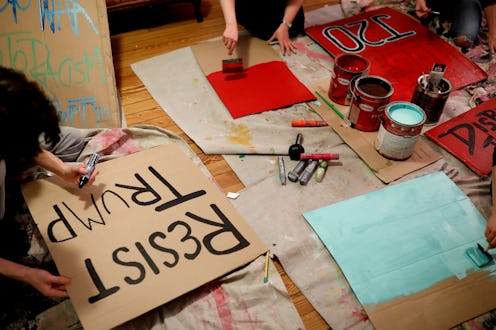
On January 21st, more than 200,000 people plan to take to the streets of Washington D.C. to participate in the Women's March On Washington. Organized as the largest demonstration yet in response to Trump's many negative comments regarding women, people of color, people with disabilities, and other marginalized people, the mile-plus march will begin at 10am on Saturday and last several hours. 386 satellite marches, for those who want to march but can't make it to D.C., are currently scheduled to occur across the country and the world — bringing the grand total of expected marchers to 735,070 people, according to the Women's March website at the time of publication. However, many people who support the ideas behind the march are unable to attend any actual marches.
Mobility issues, caretaking responsibilities, and inability to find or afford transportation and housing are just a handful of the many reasons that passionate supporters of the march's principles might not be able to make it out.
But while marching is a very visible way to support these issues, it's hardly the only way — as the organizations and events below show, folks who can't participate in the physical march can still participate in this moment of protest, no matter where they are. Your voice counts right now, no matter where you're shouting from.
Disability March
The Disability March will "march" online as part of the Women's March on Washington, displaying the images and stories of participants who register on the Disability March website. As the call for participation notes, "Many of us with a wide range of visible and invisible disabilities will be there in Washington DC for the march, but many more cannot physically march or can’t spare the expense to travel to DC. Our health conditions make physical participation difficult...In all areas—housing, transportation, food assistance, education—the disabled are vulnerable in the current climate of intolerance, and disabled people of color face compounded obstacles.
We need you to march alongside us."
As the Disability March's Sonya Huber told Bustle, the very first platform released by the organizers of the march did not have any mention of disability, and "I think this highlights the need for disability as an intersectional feminist issue that is often left off the list of essential social justice concerns." (Huber also noted that the organizers responded very quickly and added a statement to the march's unity principles recognizing disability.)
Participation is open to anyone who identifies as disabled, regardless of gender identity or sexual preference. Find out how to become a marcher here, and watch the march go live on January 20-21 here.
Love-A-Thon
Billed as the world's first Facebook Live telethon, the Love-A-Thon was organized as counter-programming for the inauguration. The event will raise funds for Planned Parenthood, the ACLU, and EarthJustice through a three hour live event that features appearances from Ilana Glazer, Jane Fonda, Chelsea Handler, Jesse Tyler Ferguson, Joseph Gordon-Levitt, Ben Harper, and many more. Viewers can pledge donations to these organizations while they watch and can also chat with other viewers via the event's Facebook page.
You can tune in to watch 12:30-3:30pm EST on Jan 20th on Facebook and Upworthy.
#MarchingWithMe
#MarchingWithMe pairs folks who are able to march in the January 21st D.C. march with those whose disabilities or chronic illnesses make them unable to march. To participate in the event, created by nonprofit Suffering the Silence, supporters who are unable to attend the march can send in their name and photo via the #MarchingWithMe website; the marcher they are partnered with will then print out that photo and wear it as they march, sharing images or video of the march with their partner.
Suffering the Silence's Allie Cashel, Erica Lupinacci, and Jacqueline Raposo told Bustle, "When you are living with illness and disability, understanding your body's limits can be an ongoing challenge. Realizing that your body is physically incapable of doing something you are so passionate about is heartbreaking. We knew there would be others in this same position and wanted to provide an opportunity for people to feel involved in such an important and historic event.
This initiative is about increasing access for those unable to attend The Women's March due to their health but also aims to foster relationships and create new dialogues with people of all abilities in this changing political climate. The Women's March represents an amazing tribe of people ready to unite and drive towards a positive future. It was important to us that everyone, especially members of the illness and disability communities, feel they will be represented and that they can contribute to this monumental day. We truly are stronger together."